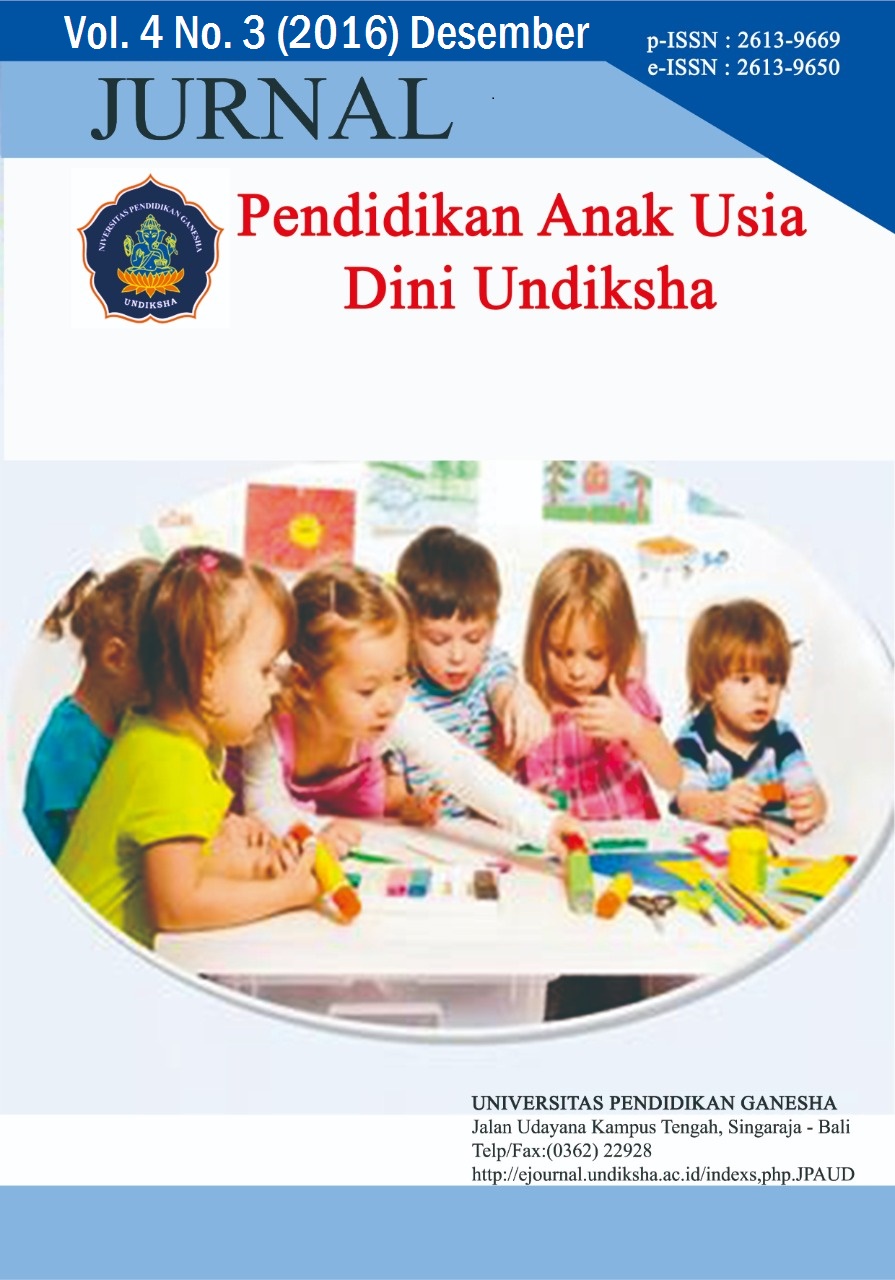PENERAPAN METODE BERMAIN PERAN UNTUK MENINGKATKAN PERILAKU KEDISIPLINAN PADA ANAK USIA 5-6 TAHUN SEMESTER I DI PAUD PRADNYA PARAMITA PENARUNGAN SINGARAJA TAHUN PELAJARAN 2016/2017
DOI:
https://doi.org/10.23887/paud.v4i3.8770Abstract
Penelitian ini bertujuan untuk mengetahui peningkatan perilaku displin anak usia 5-6 tahun di Taman Kanak-kanak setelah penerapan metode bermain peran. Penelitian ini termasuk penelitian tindakan kelas (Classroom Action Research). Subjek dari penelitan ini adalah 16 orang anak usia 5-6 Tahun di PAUD Pradnya Paramita Penarungan semester I tahun pelajaran 2016/2017. Data penelitian tindakan kelas ini dikumpulkan melalui metode observasi menggunakan lembar observasi. Analisis data menggunakan analisis statistik deskriptif dan analisis statistik deskriptif kuantitatif. Penelitian ini dilaksanakan dengan 2 siklus. Hasil penelitian menunjukkan bahwa pada siklus I rata-rata persentase perilaku displin anak adalah 60,4 %, berada pada katagori rendah, sedangkan terjadi peningkatan pada siklus II menjadi 90,6 % dengan katagori tinggi, hal tersebut menandakan bahwa terdapat peningkatan rata-rata persentase perilaku disiplin anak usia 5-6 Tahun di PAUD Pradnya Paramita pada siklus I dan siklus II sebesar 30,2%. Jadi penerapan metode bermain peran dapat meningkatkan perilaku displina anak usia 5-6 Tahun di PAUD Pradya Paramita Penarungan semester I tahun pelajaran 2016/2017.Kata Kunci : bermain peran, displin dan anak usia dini
This study aims to determine the increase of discipline behavior of children aged 5-6 years in kindergarten after the application of the method of playing the role of this study included a classroom action research (Classroom Action Research). The subject of this research are 16 children aged 5-6 years in early childhood Pradnya Paramita Penarungan first semester of academic year 2016/2017. This class action research data were collected through observation using the observation sheet. Analyzed using descriptive statistics and statistical analysis of quantitative descriptive. This research was conducted with 2 cycles. The results showed that in the first cycle the average percentage of disciplined behavior of children is 60.4%, are in the low category, while there was an increase in the second cycle to 90.6% with a high category, it indicates that an increase in the average percentage discipline the behavior of children aged 5-6 years in early child hood Pradnya Paramita in the first cycle and the second cycle of 30.2%. So the application of the method of playing the role of discipline can improve the behavior of children aged 5-6 years in early childhood Pradya Paramita Penarungan first semester of the school year 2016/2017.
keyword : Roleplay, discipline and early childhood
Published
2016-11-03
How to Cite
., P. A. R. C., ., D. I. M. T. S. M., & ., L. A. T. (2016). PENERAPAN METODE BERMAIN PERAN UNTUK MENINGKATKAN PERILAKU KEDISIPLINAN PADA ANAK USIA 5-6 TAHUN SEMESTER I DI PAUD PRADNYA PARAMITA PENARUNGAN SINGARAJA TAHUN PELAJARAN 2016/2017 . Jurnal Pendidikan Anak Usia Dini Undiksha, 4(3). https://doi.org/10.23887/paud.v4i3.8770
Issue
Section
Articles
License
Authors who publish with the Jurnal Pendidikan Anak Usia Dini Undiksha agree to the following terms:
- Authors retain copyright and grant the journal the right of first publication with the work simultaneously licensed under a Creative Commons Attribution License (CC BY-SA 4.0) that allows others to share the work with an acknowledgment of the work's authorship and initial publication in this journal.
- Authors are able to enter into separate, additional contractual arrangements for the non-exclusive distribution of the journal's published version of the work (e.g., post it to an institutional repository or publish it in a book), with an acknowledgment of its initial publication in this journal.
- Authors are permitted and encouraged to post their work online (e.g., in institutional repositories or on their website) prior to and during the submission process, as it can lead to productive exchanges, as well as earlier and greater citation of published work. (See The Effect of Open Access)











